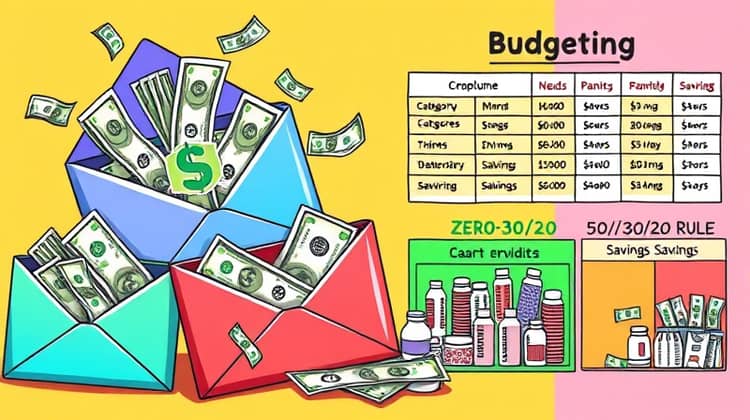Budgeting can seem overwhelming, especially for beginners. However, understanding how to manage your finances is an essential skill that can lead to financial security and peace of mind. By creating and sticking to a budget, you can control your spending, save for future goals, and reduce financial stress.
In this article, we will share five practical budgeting tips that can help you take charge of your finances. Whether you are looking to save for a vacation, pay down debt, or simply understand your financial situation better, these tips are designed to set you on the right track.
By following these steps, you can create a realistic budget that fits your lifestyle and financial goals. Let's dive into the first step of budgeting: understanding your income and expenses.
1. Understand Your Income and Expenses

The first and most crucial step in budgeting is to have a clear picture of your income and expenses. Start by listing all sources of income, such as your salary, side gigs, or any passive income. This gives you a baseline of how much money you have available to spend.
Next, track your expenses for at least a month. This includes fixed expenses like rent and utilities, as well as variable expenses such as groceries, entertainment, and dining out. Keep receipts or use an app to monitor your spending habits, as this will help you identify where your money goes.
After collecting this information, categorize your expenses into needs and wants. Understanding the difference will help you prioritize your spending and create a more effective budget.
- List all sources of income
- Track your expenses for a month
- Categorize your expenses into needs and wants
2. Set Realistic Goals

Once you have a clear understanding of where your money comes from and where it goes, it's time to set financial goals. These can range from short-term goals like saving for a new gadget to long-term goals such as buying a house or retirement planning. Setting realistic goals will provide you with a clear direction for your budgeting efforts.
Make sure your goals are specific, measurable, attainable, relevant, and time-bound (SMART). This approach will help you stay focused and motivated, as you can track your progress over time.
- Set specific savings targets
- Break down larger goals into smaller milestones
- Celebrate achievements along the way
Setting realistic goals gives you something to strive for while budgeting. It keeps you engaged and helps you make informed spending choices that contribute to achieving these goals.
3. Choose a Budgeting Method

With your income, expenses, and goals in mind, the next step is to choose a budgeting method that works best for you. There are various approaches, and the right one will depend on your preferences and lifestyle.
Some popular budgeting methods include the envelope system, where you allocate cash to different spending categories and physically separate them; zero-based budgeting, where every dollar is assigned a job, and the 50/30/20 rule, which divides your income into needs, wants, and savings. These methods can help simplify the budgeting process.
- Envelope system
- Zero-based budgeting
- 50/30/20 rule
Choosing an appropriate budgeting method is crucial for maintaining consistency in managing your finances. Try experimenting with different methods until you find one that fits your style and helps you stick to your budget.
4. Track Your Spending

Tracking your spending is an ongoing process that requires discipline and attention to detail. Make it a habit to check your budget regularly and compare your actual spending against your budgeted amounts. This will help you stay accountable and recognize any discrepancies that may arise.
Consider using budgeting apps or spreadsheets to make tracking easier. These tools allow you to record transactions quickly and visualize your financial data over time. Regularly reviewing your budget can also lead to adjustments that improve your financial situation.
Additionally, tracking your spending helps you recognize patterns over time. You might find areas where you are overspending that could use adjustment or categories where you can save more, ultimately helping you stay aligned with your goals.
- Use budgeting apps for tracking
- Review your budget regularly
- Identify areas for overspending
5. Make Adjustments as Needed

As life circumstances change, so may your income and expenses. Therefore, it's essential to revisit and adjust your budget regularly to reflect your current financial situation. This flexibility can help you stay on track with your goals.
Don't be afraid to change your budgeting methods or goals if they no longer serve you. Being adaptable is key when managing your finances, as unexpected expenses and income changes can happen at any time. Regular assessments can lead to better financial outcomes that are tailored specifically to your life stage.
Conclusion

Budgeting is a powerful tool that can empower you to take control of your finances and achieve your financial goals. By understanding your income and expenses, setting realistic goals, choosing a budgeting method, tracking your spending, and making adjustments as needed, you can create a sustainable budget that works for you.
Remember, budgeting is a skill that takes time and practice to develop. Be patient with yourself as you learn and adapt. Over time, you will find that budgeting can provide clarity, help reduce financial stress, and support a secure financial future.














